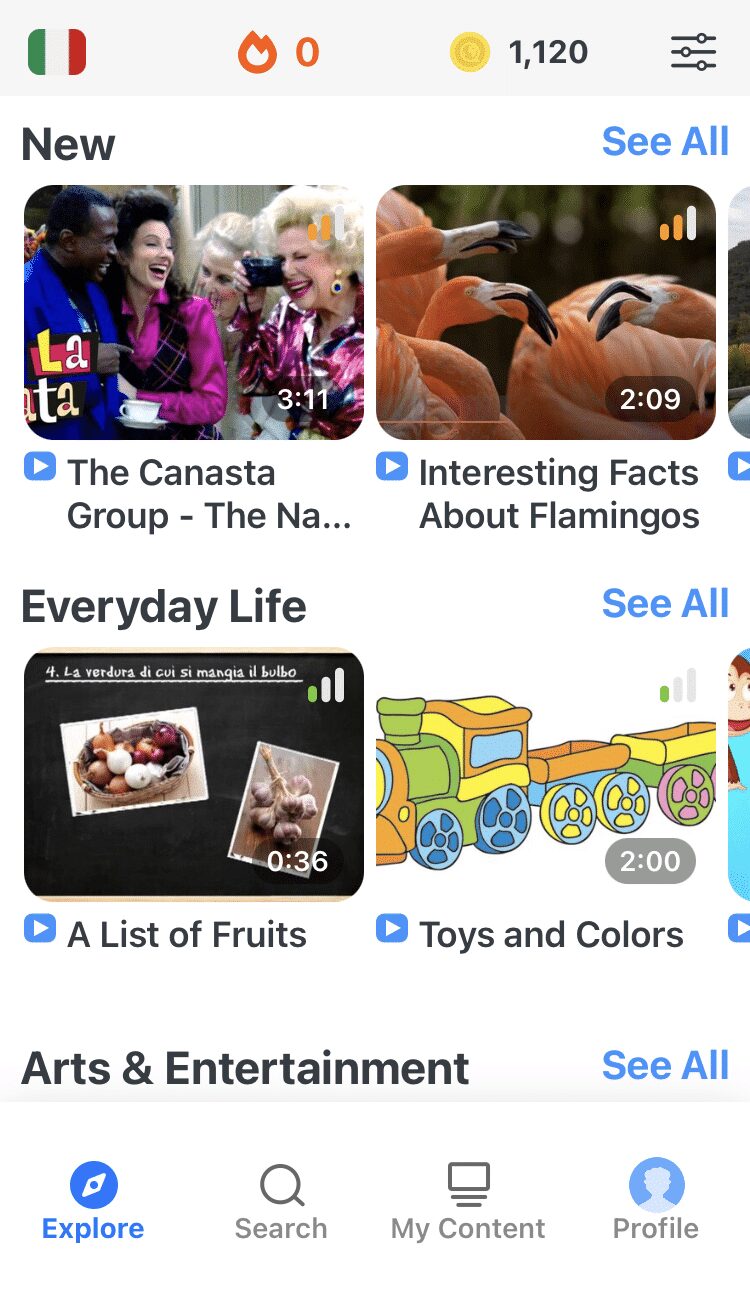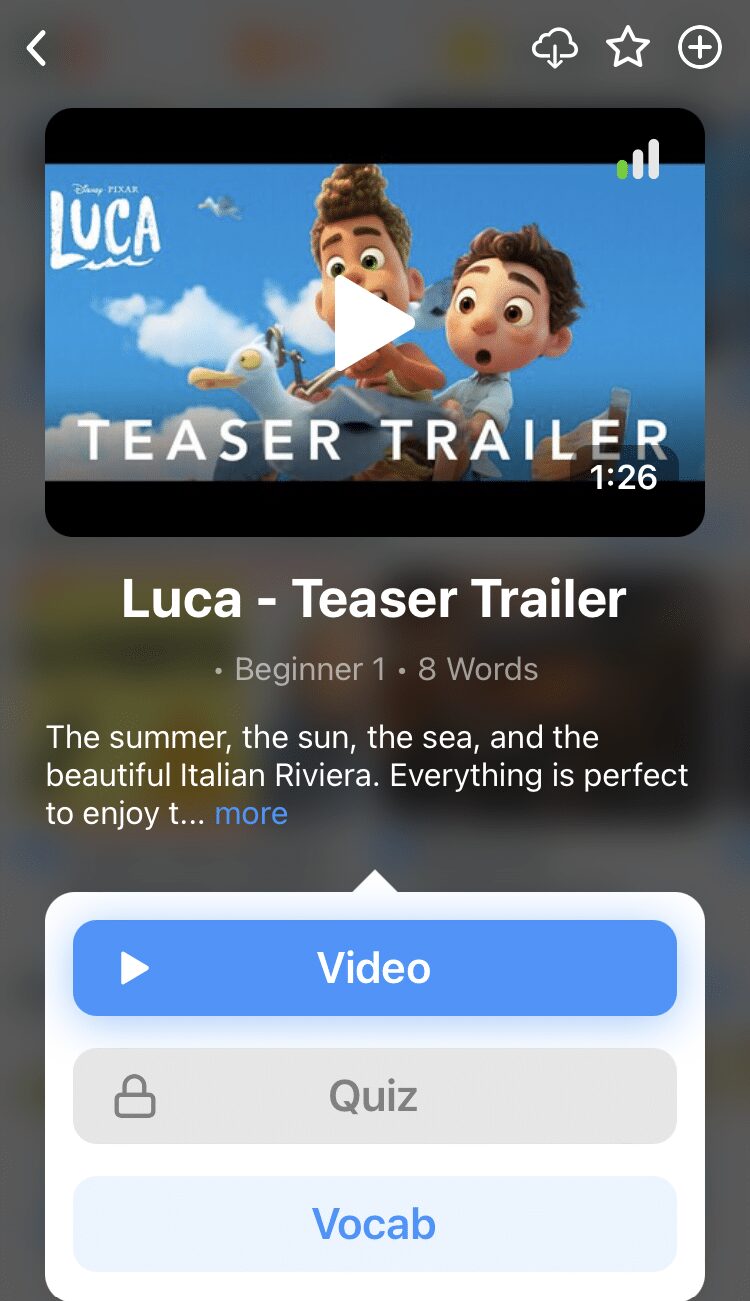How to Use Italian Superlatives

Italians speak in hyperboles and extremes. So to speak with the expressiveness of a native, you must learn how to use superlatives (adjectives or adverbs that describe the highest or lowest quality or degree of something).
To indicate the best of the worst in Italian, read on to learn about Italian superlatives and see how they are used in example sentences.
Download: This blog post is available as a convenient and portable PDF that you can take anywhere. Click here to get a copy. (Download)
Forms of the Italian Superlative
The absolute superlative ( superlativo assoluto )
The absolute superlative is used to say that something’s “very” something.
Take a look at these two phrases:
La cucina di nonna é buona. — Grandma’s cooking is good.
La cucina di nonna é buonissima! — Grandma’s cooking is very good!
Since grandma is the best chef in the world, saying that her cooking is good just doesn’t do it justice. You need to say that it’s very good.
In Italian, you do that by taking the masculine singular form of an adjective (like bello ) and cutting off the last vowel (leaving you with bell-). Then, add -issimo, -issimi, -issima or -issime, depending on the gender and number of the noun or pronoun being modified.
To understand this better, let’s see the extreme form of the word bello (beautiful/handsome) in use:
| Form | Example sentence |
|---|---|
| Bellissimo (masculine, singular) | Lui é bellissimo. — He's very handsome. |
| Bellissimi (masculine or mixed gender, plural) | Loro sono bellissimi. — They're (male or mixed gender) very handsome. |
| Bellissima (feminine, singular) | Lei é bellissima. — She's very beautiful. |
| Bellissime (feminine, plural) | Loro sono bellissime. — They're (female) very beautiful. |
You can pretty much add -issimo/a/i/e to any adjective to form the absolute superlative.
For example:
| Adjective | English translation | Example sentence |
|---|---|---|
| Brutto | Ugly | Quelle scarpe sono bruttissime! — Those shoes are hideous! |
| Bravo | Good, talented, well behaved | La bimba é bravissima. — The little girl is very good. |
| Caldo | Hot | Stai attento! Il forno é caldissimo. — Watch out! The oven is very hot. |
| Freddo | Cold | É freddissimo fuori. — It's freezing (i.e. very cold) outside. |
Irregular Italian superlatives
There are a few superlative adjectives with irregular spellings. These words are often used to describe extreme situations and are best just memorized in their superlative form:
| Superlative | English translation | Example sentence |
|---|---|---|
| Ottimo | The best, optimal, excellent | Questo é un vino ottimo! — This is an excellent wine! |
| Pessimo | Awful, terrible | Ma questo... é pessimo. — But this [wine] is terrible. |
| Massimo | Maximum | Ho il massimo rispetto per lei. — I have the utmost respect for her. |
| Minimo | Minimum | Si può fare questo lavoro con una conoscenza minima. — This job can be done with minimal knowledge. |
| Infimo | The lowest, least | Quei prodotti sono di infima qualità. — Those products are of the lowest quality. |
There are also a handful of words that take -errimo as an ending in the absolute superlative:
| Adjective | English translation | Example sentence |
|---|---|---|
| Celebre | Famous | Lei fu la protagonista di una celeberrima pellicola. — She was the protagonist of a very famous movie. |
| Misero * | Miserable | A volte è difficile vivere in questo miserrimo mondo. — Sometimes it's hard to live in this miserable world. |
| Aspro ** | Sour | Questo vino è pessimo: é asperrimo. — This wine is terrible: it's very sour. |
| Acre | Bitter | Lui è il mio acerrimo nemico. — He is my worst enemy. |
| Integro | Honest | Lo chiamavano "honest Abe" perché era integerrimo. — They called him "honest Abe" because he was so honest. |
| Salubre | Healthy | Si dice che il frappé di cavolo sia saluberrimo. — They say that kale smoothie is super healthy. |
| Tetro *** | Gloomy | I film di Tim Burton possono essere teterrimi. — Tim Burton's movies can be very gloomy. |
*It’s more common to hear the regular superlative form miserissimo .
**While this irregular superlative form exists, its regular form ( asprissimo ) is more widely used.
***The superlative teterrimo is rarely used in Italian, but it’s worth knowing!
The relative superlative
This form is also used to express high praise (or disdain!) but instead of saying someone’s very good or very bad, you use the relative superlative to say someone’s the best or the worst.
It’s called the relative superlative because the description is always relative to something else, even if it’s not mentioned in the sentence. If you’re talking about “the best singer,” for instance, you’re implying that there are other singers who aren’t as good.
There are a few words you can use to describe the best or worst of something:
| Relative superlative | English translation | Example sentence |
|---|---|---|
| Migliore | The best | Luciano é il cantante migliore. — Luciano is the best singer. |
| Peggiore | The worst | La Torta di Frutta è il peggiore dolce di Natale. — Fruitcake is the worst Christmas dessert. |
| Minore | The least, lesser | Il male minore. — The lesser evil. |
| Maggiore * | Bigger, greater, superior | La sua conoscenza della lingua italiana é maggiore della mia. — His knowledge of Italian is greater than mine. |
*Sometimes you’ll hear maggiore shortened to maggior in certain phrases like Per la maggior parte… meaning “for the most part…”.
Another way of expressing extremes is by using il più (the most) and il meno (the least). You can put il più or il meno in front of any adjective to indicate that the subject is the most or least of something.
For example:
Il peperoncino calabrese è il più piccante di tutta l’Italia. — The peperoncino calabrese [pepper] is the spiciest in all of Italy.
E il peperone è il meno piccante. — And the bell pepper is the least spicy.
Italian Superlative in Use
Just like in English, you use the superlative when you want to describe a person or thing that’s the best, worst, biggest, smallest, most awesome, etc.
Superlative words can be used as adverbs to describe actions (verbs). In Italian, a superlative adverb always appears in the masculine singular form.
Usain Bolt corre velocissimo. — Usain Bolt runs very fast.
Remember that even if the subject is female or plural, the word’s ending doesn’t change:
Anche Dafne Schippers corre velocissimo. — Also, Dafne Schippers [female runner from The Netherlands] runs very fast.
Una lumaca non corre, ma cammina lentissimo.
— A snail doesn’t run but crawls very slowly.
(Note: camminare
for humans means “to walk,” but for insects it translates to “to crawl” or “to creep.”)
A useful way to learn how to use Italian superlatives is by seeing them in action. For example, you could listen out for them in an Italian movie or try using an immersive language learning program like FluentU to see how superlatives and other terms are used by native speakers.
FluentU takes authentic videos—like music videos, movie trailers, news and inspiring talks—and turns them into personalized language learning lessons.
You can try FluentU for free for 2 weeks. Check out the website or download the iOS app or Android app.
P.S. Click here to take advantage of our current sale! (Expires at the end of this month.)
Using the Superlative to Search for Information Online
So now that you know how to form Italian superlatives, you can start to use them in your conversations.
For an even more immediate use, try applying superlatives to your internet searches.
How many times have you searched for the best solution to a problem or the worst foods for your health in your own language? The same can be done in Italian.
For instance, let’s say you want to find out what the best kind of bread is. Maybe you want to learn how to make bread at home or you’re just curious. You could type the following search query:
il pane più buono — the best bread
Here’s an example of an article that may appear in your results:
“Il pane più buono? Quello che fai tu” — “The best bread? The kind you make yourself”
Or maybe you love Italian food and want to find out more about the most famous Italian pizzas. Just search for this phrase:
pizze più famose — most famous pizzas
And you might get a delicious result like this:
“Le dieci pizze più famose a Napoli oltre la Margherita” — “The ten most famous pizzas in Naples besides the Margherita”
You can also use the absolute superlative to find information online.
For example, you can type in montagne bellissime if you’re looking for images of beautiful mountains. You might also find:
“Il bellissimo video che celebra le Dolomiti” — “The very beautiful video that celebrates the Dolomites [mountains in Northern Italy]”
Or maybe you want to know why Ronaldo always shows his abs when he scores a goal:
“Ronaldo festeggia il gol e mostra gli addominali: «La mia ragazza dice che sono bellissimo quando lo faccio»” — “Ronaldo celebrates a goal by showing his abs ‘My girlfriend says that I’m very beautiful when I do that’ [interview]”
Now you know how to turn regular Italian words into the most awesome. Aren’t Italian superlatives just the best?
Download: This blog post is available as a convenient and portable PDF that you can take anywhere. Click here to get a copy. (Download)
And One More Thing...
If you're as busy as most of us, you don't always have time for lengthy language lessons. The solution? FluentU!
Learn Italian with funny commericals, documentary excerpts and web series, as you can see here:

FluentU helps you get comfortable with everyday Italian by combining all the benefits of complete immersion and native-level conversations with interactive subtitles. Tap on any word to instantly see an image, in-context definition, example sentences and other videos in which the word is used.

Access a complete interactive transcript of every video under the Dialogue tab, and review words and phrases with convenient audio clips under Vocab.

Once you've watched a video, you can use FluentU's quizzes to actively practice all the vocabulary in that video. Swipe left or right to see more examples of the word you’re on.

FluentU will even keep track of all the Italian words you’re learning, and give you extra practice with difficult words. Plus, it'll tell you exactly when it's time for review. Now that's a 100% personalized experience!
The best part? You can try FluentU for free with a trial.
Start using the FluentU website on your computer or tablet or, better yet, download the FluentU app from the iTunes or Google Play store. Click here to take advantage of our current sale! (Expires at the end of this month.)








